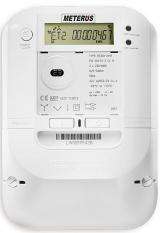September 14, 2010 report
Home energy monitors may not cut electricity use

(PhysOrg.com) -- Home energy monitors (smart meters or Home Energy Management Systems (HEMS)), monitor the energy used by households and/or individual appliances within the home, and they are often recommended to encourage energy conservation. Now a new study has analyzed the effectiveness of installing the devices and discovered that savings were not sustained over the longer term.
A Dutch literature review and case study examined the energy conservation behaviors of participants in the Netherlands, to find out whether or not they sustained changes in electricity consumption over 15 months, which is 11 months longer than earlier studies have covered.
The researchers from Delft University of Technology wanted to find out if early reductions in energy consumption were continued over a longer period. They trialed energy monitors with 304 participants over four months, and then gave them the option of retaining the monitor. Those who kept the monitor were surveyed again 11 months later.
The findings showed there were initial savings in electricity consumption of an average of 7.8% over the first four months, but these savings were not sustained over the medium to long term.
The study also found some people were more receptive to energy saving behavior changes than others and quickly developed new habits, giving them continuing substantial savings.
The researchers concluded that more research is needed into the design and usability of HEMS, but also on social science issues and contextual factors, and that installing energy monitors alone would not necessarily reduce electricity consumption.
The paper was published in the September edition of the Building Research and Information journal. A British paper in the same issue of the journal analyzed how householders used feedback on their energy consumption provided by smart meters in the UK, and found that energy consumption was not necessarily reduced by access to the information.
Author of the British paper, Sarah Darby of the University of Oxford’s Environmental Change Institute, said feedback was considered an important factor in reducing energy demand because many people are using energy without realizing it. However, she said there is still a lot of confusion surrounding the smart meter, with some meters providing more information than others.
In the UK, smart meters with real-time electricity use displays will be installed in over 27 million homes and two million other sites during the next decade. Dr. Darby said the meters could lead to more effective electricity distribution in the future even if they did not reduce the total use of electricity because it would enable suppliers to manage loads on the system more effectively.
More information: Home energy monitors: impact over the medium-term, S. S. van Dam et al., Building Research & Information, Volume 38, Issue 5 September 2010 , pages 458 - 469. DOI:10.1080/09613218.2010.494832
© 2010 PhysOrg.com



















